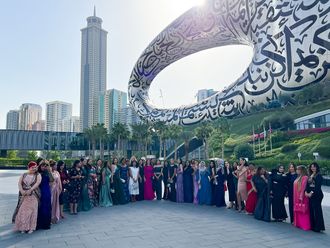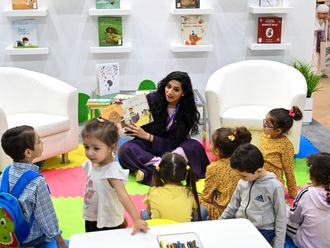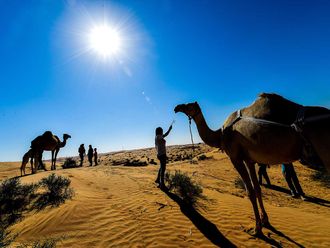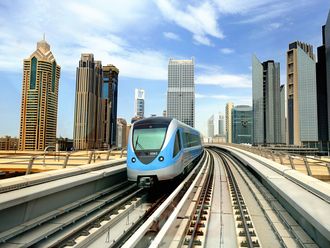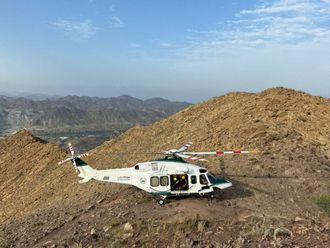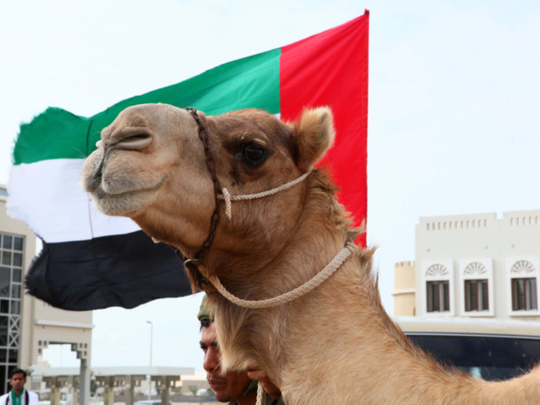
Every year in June, palm leaves are pruned for use in Arish houses, which are made of dried leaves. These houses form one of the ingredients that make up the National Day festivities in December, which are typically a celebration of heritage as much as they are a statement of pride in the nation today.
In recent years, National Day has grown into a large and public celebration of the UAE. Typical events feature cooking displays, traditional dances and women showcasing local handicrafts. For the outsider, it is a glimpse into Emirati culture. One is also almost guaranteed an encounter with falcons, salukis, horses and camels.
“This is our local, Emirati brand,” says Dr Mohammad Al Naeemat, Chairman of the AD Box group of companies, which organised about 40 events for various public and private groups for the 40th National Day, celebrated last year. “It’s good to showcase local culture. In any office in the UAE, there are fewer local people than expats. The event becomes a platform to show how the locals are united.”
The list of deliverables depends on the budget, which could be anywhere between Dh15,000 and Dh250,000. The more elaborate — and costly — events include all types of handicrafts, live cooking stations, dances with up to 60 dancers and the fauna that epitomises the UAE.
“We used to make houses with palm leaves. We used to ride everywhere by camel, horse or donkey. In fact, the donkey is also traditionally a part of the culture. Not everyone was rich; it is like today’s cars — you can get yourself a Corolla, or a four-wheel drive or you have a Rolls-Royce. The latter is like owning a horse in the old days,” says Al Naeemat.
For the event, the Arish houses are three-sided — the front is left open to reveal the activities inside, where women practise traditional crafts. Ribs of dried leaves are fashioned into domed fishing traps. The fibre from the tree trunk is used to make ropes or baskets, mats and pyramid-shaped covers that protect food from flies.
Outsourcing talent
“Women, many of them from the Western Region, are supported by various charity foundations or by the Ministry of Social Affairs. Some are affiliated to the Abu Dhabi Travel Authority. If there are exhibitions in other countries, they travel with the foundation,” says Al Naeemat.
“Last year, we had Egyptians, Ethiopians, Somalians, Iranians and Indians manning our traditional food displays. Some of the craftswomen come from Oman. During the final three days of celebrations, when everyone had events, we hired about 60 people from Oman.”
Activities usually include animals. “When there is space, we bring horses and camels. The falcon can go anywhere, indoor or outdoor. We try to bring well-trained falcons that don’t startle when handled, so visitors are comfortable with them. Similarly, even though I own race horses and camels, we bring the quieter ones, sometimes those that have retired from the races, for rides,” Al Naeemat explains.
Getting it right
He says the UAE encourages the breed of falcons in captivity. “There are so many competitions throughout the year, so it can be quite rewarding to own a falcon, a saluki, a camel or a horse. At competitions, sometimes they say this falcon or this camel has won three cars or two cars.”
For the event, breeders rent out well-behaved falcons, horses and camels. “We buy about two or three falcons sometimes and rent as many as 30. My horses are for racing, not riding, so I hire them. I do have camels for riding, so bring my own,” says Al Naeemat, who owns about 40 horses and 26 camels.
No expense is too high and no effort too much for a National Day event. “After all,” he says, “some of these events are attended by minsters and the royal family. It is important that we get it right.”


